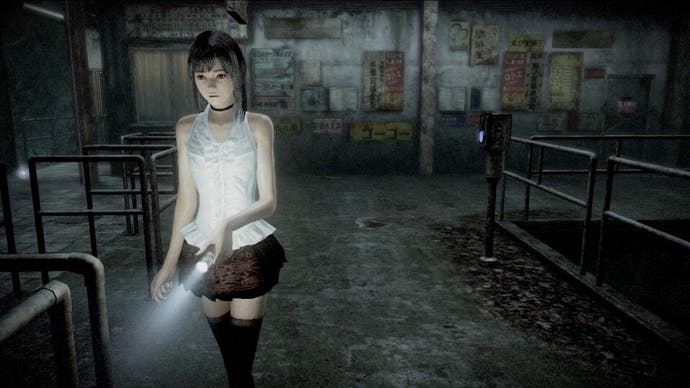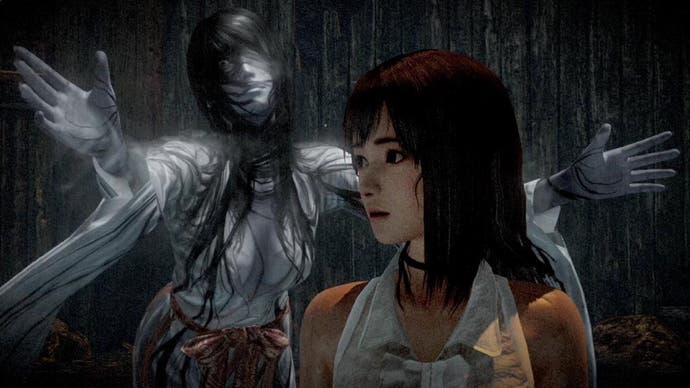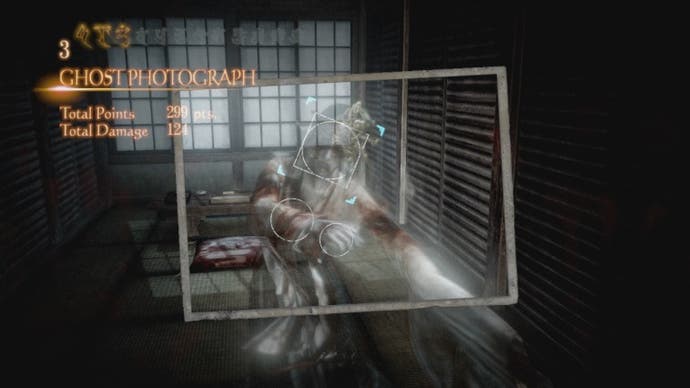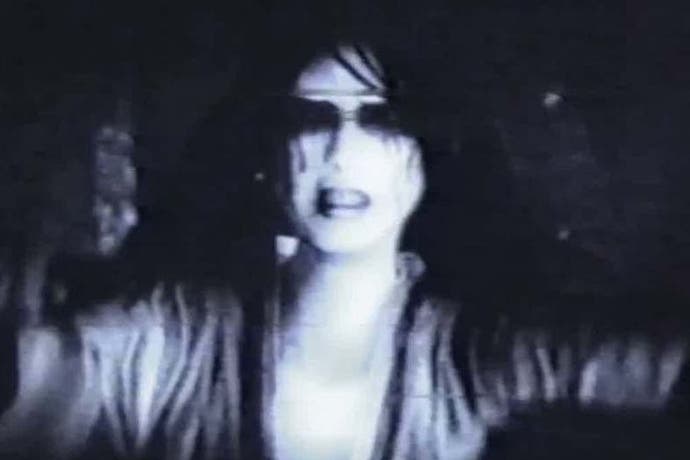Project Zero: Maiden of Black Water review
Craperture.
When my friends and I used to play the old Project Zero games (known as Fatal Frame in the US) way back in the early 2000s, we had one rule: the lights must always be off. If we had to take a bathroom break or go to the kitchen to giggle over our frayed nerves, a lamp was allowed, but once you had the controller in your hand, you had to fully commit. Sat in darkness, we'd scare ourselves silly under the glow of the old CRT monitor. It was our ritual when playing a series all about rituals. How ironic that in Project Zero's newest incarnation, the Wii U exclusive Maiden of Black Water, the lights are on, but no-one seems to be home. It's a mess.
Maiden of Black Water's main protagonist is Yuri, a doe-eyed teenager who, as far as her limited facial animations will allow us to ascertain, seems to be a bit sad about something. She has the ability to see 'traces' of missing things, including people, and is staying with another woman with the same ability, who has taken her on as an apprentice of sorts in her antique shop/paranormal detective agency. They live close to a spooky mountain surrounded by a spooky forest where people tend to go to kill themselves at sunset, and what follows is 10-12 hours of a half-baked plot involving virginal sacrifices and scorned women and increasingly spurious reasons for Yuri and a bunch of equally patient-faced adolescent women (and one grown man) to go up the mountain at sunset despite knowing full-well what's waiting for them up there; jagged, glitchy ghosts that look like they've been fully recycled from the PlayStation 2 originals.

The game's 13 chapters, or 'drops,' follow a similar pattern. Someone has wandered off into the mountain, and the current playable character (there are three) must go and retrieve them, sometimes accompanied by a companion whose only discernible role seems to be to mumble, dead-panned, some exposition every 20 minutes or so. You'll meet ghosts, you'll take photos of them, and then you'll run back down the mountain the way you came until the chapter abruptly ends with a text box that fills you in on the rest of the story.
Maiden of Black Water follows in the grand tradition of Project Zero titles in that your only weapon is an old camera capable of exorcising the ghosts it photographs. Here though, there are two cameras with slightly different abilities; one can take multiple photos at a time or slow a ghost's movement, for example, while the other can be equipped with different lenses that grant extra damage or gift health back to its user. You can upgrade all of these facets using points you accrue through particularly skilful photography, but the difference it all makes is negligible.
There are also different films you can find, buy and equip which will do more damage to ghosts but, again, it doesn't make so much of a difference that you should stockpile the better film for later in the game. I defeated the final boss with nothing but the basic film that you have an infinite supply of, though it took about five times longer than it was supposed to thanks to a key prompt signalling the end of the battle repeatedly failing to appear. Actually, that was probably the first and only time I felt the cold creep of dread down my spine; am I doomed to play this boss fight until my limbs atrophy and my soul departs? Is this how I become a Shrine Maiden?

It's a shame too because a spooky old camera seems like the role the Wii U GamePad was born to play. You control a character in third person on the TV screen until a ghost comes along, whereupon you press a button to switch to a first person viewpoint using the GamePad as the camera's viewfinder. One of the game's most engaging mechanics was a special attack you could deploy only when fitting more than five of a ghost's weak points in shot at once, prompting you to turn and tilt the game pad to either portrait or landscape or anywhere in between in order to get the most effective angle. Other than that though, the controls simply do not work very well.
During a battle, the gyroscope would frequently lose its place and I'd be flipped around with my back to the ghost; eventually it was all so disorienting that I gave up and just used the right analogue stick to frame my shots instead. Basic movement controls don't fare much better; the general slowness of characters has been ingrained in this series ever since Miku Hinasaki first took about a half an hour to climb a ladder, but here they feel clunkier than usual, and it leads to battles and general exploration being far more frustrating than they should be. The only times I died during the entire game was during a chase sequence where touching a ghost spelled instant death. They kept teleporting directly in front of me and the controls were so sluggish I had no choice but to run into their loving embrace. It was not fun.
Technical issues aside, one of Maiden of Black Water's other problems is that it simply doesn't trust you. It doesn't trust you not to die and throws a near-limitless supply of healing items your way, thus destroying any sense of dread or urgency. It doesn't trust you to see or find anything important for yourself, so once you get close enough to a key item you'll be transported immediately to it and it'll automatically be picked up and scrutinised. This is, however, preferable to what happens when you move to pick up any non-essential item like a healing water or roll of film.
Hold down the right trigger on the game pad and the character will begin the painfully slow process of reaching for the item, but at any time during this a glowing cartoon arm could reach across and grab for them. Let go of the trigger in time and you'll escape their grasp but have to repeat the entire thing, fail to let go of the trigger in time and you'll have to rattle the analogue sticks until it relinquishes its grip, and then have to repeat the entire thing. It's annoying, time-consuming and not even slightly scary. I began to invent a back-story for Ghost Hands. Perhaps he was just misunderstood. Maybe Ghost Hands was trying to do me a favour, reaching between the void of game world and real world to warn me of the mediocrity that lay ahead. In hindsight, Ghost Hands was my only true friend.

It's telling that the ghosts are likely the only characters you'll form any kind of bond with, since they show markedly more emotion than any of the lifeless living protagonists. It's not just the awful English voice acting; the threadbare plot means nobody cares about anything and no-one is given any meaningful motivation, and themes like suicide are thrown around with no real sense of weight. I was forced to come to the conclusion that the characters were all just incredibly stupid, wandering, emotionless, into almost certain death for no discernible reason again and again and expecting a different outcome every time. By the end the only one I was rooting for was Ghost Hands. Long may he very slightly impede everyone's progress.
Mostly, Maiden of Black Water sticks closely to the franchise's classic formula, which, I now fear after playing this, feels a bit dated. But even when Maiden tries to do something different, it botches it. There are a couple of sequences where the characters will be transported back to their antiques shop hub, and the majority of them will immediately fall into a deep sleep - presumably because the very act of staying alive is such a herculean effort for them. One character will then be tasked with keeping watch over the shop's looping security camera feed as it cycles through the various rooms. If you spot something untoward, you go investigate. Its Black Water's attempt to bring the Project Zero series into the 21st century, but when the predictable jump scare normally accompanying this kind of set-up inevitably happens, its effect is comedic, not horrific.
I was hoping for a return to form for this series, a reason to sit around in the dark with those same friends and relive the rituals of old. What Maiden of Black Water is instead is a repetitive slog through the same environments meeting the same ghosts so often that any power they have to scare is very quickly lost. If you've never played a Project Zero game before, you might well enjoy some of the more atmospheric locations; the tattered tatami mats, the glowing Shinto shrines, the - I wish I was making this up - womb cavern. But otherwise, don't turn off the lights. Turn off the console, get up, walk out, and close the door behind you.



